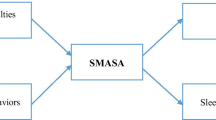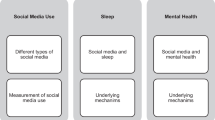Abstract
Objectives
This study had two major aims: (1) to explore the relationship between sleep related difficulties and behavioral and emotional problems in young children, and (2) to identify predictors of child fear and problematic sleep behaviors.
Methods
Sixty-eight children (34 boys), ages 4–6 years (M = 4.9, SD = 0.9) who experienced nighttime fears and who co-slept with their parents were evaluated using parental reports of internalizing and externalizing behavioral problems, sleep difficulties and related anxiety, as well as child and parental reports of fear.
Results
Child-reported fear was significantly predicted by internalizing problems when controlling for other variables whereas parent-reported fear was primarily related to child endorsed fears on a preschool fear questionnaire when controlling for the other variables. In contrast, sleep-related problems were primarily related to externalizing behavior problems whereas the number of nights slept alone was primarily related to separation anxiety on a preschool anxiety questionnaire.
Conclusions
Findings from the present study point to the multiplicity of factors that account for nighttime fears and sleep difficulties in young children. Child fear and separation anxiety were related to co-sleeping. Moreover, internalizing symptoms in young children predicted child fear whereas, externalizing symptoms predicted sleep problems. Based on the reciprocal relationship between emotional/behavior problems and sleep, frequent co-sleeping and nighttime fears might serve as a risk and/or maintaining factor of disrupted sleep practices. When treating nighttime fears in young children, co-sleeping should be targeted for intervention as well.
Similar content being viewed by others
References
Achenbach, T. M., & Rescorla, L. A. (2000). Manual for the ASEBA preschool forms & profiles. Burlington, VT: University of Vermont, Research Center for Children, Youth, & Families.
Alfano, C. A., Ginsburg, G. S., & Kingery, J. N. (2007). Sleep-related problems among children and adolescents with anxiety disorders. Journal of the American Academy of Child and Adolescent Psychiatry, 46(2), 224–232. https://doi.org/10.1097/01.chi.0000242233.06011.8e.
American Psychiatric Association. (2013). Diagnostic and statistical manual of mental disorders. 5th ed. Washington, DC: American Psychiatric Association.
Batista, B. H. M., & Nunes, M. L. (2006). Validação para Língua Portuguesa de Duas Escalas para Avaliação de Hábitos e Qualidade de Sono em Crianças. Journal of Epilepsy and Clinical Neurophysiology, 12(3), 143–148.
Broeren, S., & Muris, P. (2008). Psychometric evaluation of two new parent-rating scales for measuring anxiety symptoms in young Dutch children. Journal of Anxiety Disorders, 22(6), 949–958. https://doi.org/10.1016/j.janxdis.2007.09.008.
Clementi, M. A., & Alfano, C. A. (2014). Targeted behavioral therapy for childhood generalized anxiety disorder: A time-series analysis of changes in anxiety and sleep. Journal of Anxiety Disorders, 28(2), 215–222. https://doi.org/10.1016/j.janxdis.2013.10.006.
Cortesi, F., Giannotti, F., Sebastiani, T., Vagnoni, C., & Marioni, P. (2008). Cosleeping versus solitary sleeping in children with bedtime problems: child emotional problems and parental distress. Behavioral Sleeping Medicine, 6(2), 85–105. https://doi.org/10.1080/15402000801952922.
Crowell, J., Keener, M., Ginsburg, N., & Anders, T. (1987). Sleep habits in toddlers 18–26 months of age. Journal of the American Academy of Child and Adolescent Psychiatry, 26, 510–515.
Friedman, A. G., & Ollendick, T. H. (1989). Treatment programs for severe night-time fears: A methodological note. Journal of Behavior Therapy and Experimental Psychiatry, 20(2), 171–178.
Gordon, J., King, N., Gullone, E., Muris, P., & Ollendick, T. H. (2007a). Treatment of children’s nighttime fears: The need for a modern randomised control trial. Clinical Psychology Review, 27(1), 98–113. https://doi.org/10.1016/j.cpr.2006.07.002.
Gordon, J., King, N., Gullone, E., Muris, P., & Ollendick, T. H. (2007b). Nighttime fears of children and adolescents: Frequency, content, severity, harm, expectations, disclosure, and coping behaviours. Behaviour Research and Therapy, 45(10), 2464–2472. https://doi.org/10.1016/j.brat.2007.03.013.
Gregory, A. M., Eley, T. C., O’Conner, T. G., & Plomin, R. (2004). Etiologies of associations between childhood sleep and behavioral problems in a large twin sample. Journal of the American Academy of Child and Adolescent Psychiatry, 43(6), 744–751. https://doi.org/10.1097/01.chi/0000122798.47863.a5.
Gregory, A. M., Ende, J. V., Willis, T. A., & Verhulst, F. C. (2008). Parent-reported sleep problems during development and self-reported anxiety/depression, attention problems, and aggressive behavior later in life. Archives of Pediatrics and Adolescent Medicine, 162, 330–335. https://doi.org/10.1001/archpedi.162.4.330.
Gregory, A. M., & Sadeh, A. (2012). Sleep, emotional and behavioral difficulties in children and adolescents. Sleeping Medicine Reviews, 16(2), 129–136. https://doi.org/10.1016/j.smrv.2011.03.007.
Hall, W. A., Zubrick, S. R., Silburn, S. R., Parsons, D. E., & Kurinczuk, J. J. (2007). A model for preditcting behavioural sleep problems in a random sample of australian pre-schoolers. Infant and Child Development, 16, 509–523. https://doi.org/10.1002/icd.527.
Hayes, M. J., Roberts, S. M., & Stowe, R. (1996). Early childhood co‐sleeping: Parent‐child and parent‐infant nighttime interactions. Infant Mental Health Journal: Official Publication of The World Association for Infant Mental Health, 17(4), 348–357. https://doi.org/10.1002/(SICI)10970355(199624)17:4%3C348::AID-IMHJ6%3E3.0.CO;2-I.
Hersen, M., & Bellack, A. S. (1988). Dictionary of behavioral assessment techniques. New York: Pergamon Press.
Iwata, S., Iwata, O., & Matsuishi, T. (2013). Sleep patterns of Japanese preschool children and their parents: implications for co-sleeping. Acta Paediatrica, 102, e257–e262. https://doi.org/10.1111/apa.12203.
Kahn, M., Ronen, A., Apter, A., & Sadeh, A. (2017). Cognitive-behavioral versus non-directive therapy for preschoolers with severe nighttime fears and sleep-related problems. Sleeping Medicine, 32, 40–47. https://doi.org/10.1016/j.sleep.2016.12.011.
Kushnir, J., Gothelf, D., & Sadeh, A. (2014). Nighttime fears of preschool children: A potential disposition marker for anxiety? Comprehensive Psychiatry, 55, 336–341. https://doi.org/10.1016/j.comppsych.2013.08.019.
Kushnir, J., & Sadeh, A. (2011). Sleep of preschool children with night-time fears. Sleeping Medicine, 12, 870–874. https://doi.org/10.1016/j.sleep.2011.03.022.
Kushnir, J., & Sadeh, A. (2012). Assessment of brief interventions for nighttime fears in preschool children. European Journal of Pediatrics, 171(1), 67–75. https://doi.org/10.1007/s00431-011-1488-4.
Lewis, K. M., Amatya, K., Coffman, M. F., & Ollendick, T. H. (2015). Treating nighttime fears in young children with bibliotherapy: evaluating anxiety symptoms and monitoring behavior change. Journal of Anxiety Disorders, 30, 103–112. https://doi.org/10.1016/j.janxdis.2014.12.004.
McNamara, P., Belsky, J., & Fearon, P. (2003). Infant sleep disorders and attachment: Sleep problems in infants with insecure-resistant versus insecure-avoidant attachments to mother. Sleeping and Hypnosis, 5, 17–26.
Mindell J. A., Sadeh A., Kohyama J., & How T. H. (2010). Parental behaviors and sleep outcomes in infants and toddlers: a cross-cultural comparison. Sleeping Medicine, 11, 393–399. https://doi.org/10.1016/j.sleep.2009.11.011.
Muris, P., Merckelbach, H., Mayer, B., & Prins, E. (2000). How serious are common childhood fears? Behaviour Research and Therapy, 38(3), 217–228. https://doi.org/10.1016/S0005-7967(98)00204-6.
Muris, P., Merckelbach, H., Ollendick, T. H., King, N. J., & Bogie, N. (2001). Children’s nighttime fears: parent–child ratings of frequency, content, origins, coping behaviors and severity. Behaviour Research and Therapy, 39(1), 13–28. https://doi.org/10.1016/S0005-7967(99)00155-2.
Ollendick, T. H. (1983). Reliability and validity of the revised fear survey schedule for children (FSSC-R). Behaviour Research and Therapy, 21, 685–692.
Ollendick, T. H., Hagopian, L. P., & Huntzinger, R. M. (1991). Cognitive-behavior therapy with nighttime fearful children. Journal of Behavior Therapy and Experimental Psychiatry, 22(2), 113–121.
Palmer, C., Clementi, M. A., Meers, J. M., & Alfano, C. A. (2018). Co-sleeping among school-aged anxious and non-anxious children: associations with sleep variability and timing. Journal of Abnormal Child Psychology. https://doi.org/10.1007/s10802-017-0387-1.
Rafihi-Ferreira, R., Silvares, E. F. M., Asbahr, F. R., & Ollendick, T. (2018). Brief treatment for nighttime fears and co-sleeping problems: A randomized clinical trial. Journal of Anxiety Disorders, 58, 51–60. https://doi.org/10.1016/j.janxdis.2018.06.008.
Rafihi-Ferreira, R., Silvares, E. F. M., Pires, M. L. N., Assumpção-Jr, F. B., & Moura, C. B. (2016). Sono e comportamento em crianças atendidas em um serviço de psicologia. Revista Psicologia: Teoria e Prática, 18(2), 159–172. https://doi.org/10.15348/1980-6906/psicologia.v18n2p159-172.
Sadeh, A. (2005). Cognitive-behavioral treatment for childhood sleep disorders. Clinical Psychology Review, 25, 612–628. https://doi.org/10.1016/j.cpr.2005.04.006.
Sadeh, A., Tikotzky, L., & Scher, A. (2010). Parenting and infant sleep. Sleeping Medicine Review, 19, 103–110. https://doi.org/10.1016/j.smrv.2009.05.003.
Scher, A., Zukerman, S., & Epstein, R. (2005). Persistent night waking and settling difficulties across the first year: early precursors of later behavioural problems? Journal of Reproductive and Infant Psychology, 23, 77–88. https://doi.org/10.1080/02646830512331330929.
Shang, C. H., Gau, S. S. F., & Soong, W. T. (2006). Association between childhood sleep problems and perinatal factors, parental mental distress and behavioral problems. Journal of Sleeping Research, 15(1), 63–73. https://doi.org/10.1111/j.1365-2869.2006.00492.x.
Sivertsen, B., Harvey, A. G., Reichborn-Kjennerud, T., Torgersen, L., Ystrom, E., & Hysing, M. (2015). Later emotional and behavioral problems associated with sleep problems in toddlers: a longitudinal study. The Jounal of the American Medical Association Pediatrics, 169(6), 575–582. https://doi.org/10.1001/jamapediatrics.2015.0187.
Sourander, A. (2001). Emotional and behavioural problems in a sample of finnish three-year-olds. European Child & Adolescent Psychiatry, 10(2), 98–104. https://doi.org/10.1007/s007870170032.
Spence, S. H., Rapee, R., McDonald, C., & Ingram, M. (2001). The structure of anxiety symptoms among preschoolers. Behaviour Research and Therapy, 39(11), 1293–1316. https://doi.org/10.1016/S0005-7967(00)00098-X.
Stein, M. A., Mendelsohn, J., Obermeyer, W. H., Amromin, J., & Benca, R. (2001). Sleep and behavior problems in scholl-aged children. Pediatrics, 107, e60.
Stewart, S. E., & Gordon, J. E. (2014). Parent-assisted cognitive-behavioural therapy for children’s nighttime fear. Behaviour Change, 31(4), 243–257. https://doi.org/10.1017/bec.2014.19.
Warren, S. L., Ollendick, T. H., & Simmens, S. J. (2008). Reliability and validity of the fear survey schedule for infants-preschoolers. Depression and Anxiety, 25(12), E205–E207. https://doi.org/10.1002/da.20344.
Weiner, C. L., Elkins, R. M., Pincus, D., & Comer, J. (2015). Anxiety sensitivity and sleep-related problems in anxious youth. Journal of Anxiety Disorders, 32, 66–72. https://doi.org/10.1016/j.janxdis.2015.03.009.
Author Contributions
R.R.F. designed and executed the study, assisted with the data analyses, and wrote the paper. K.M.L. assisted with the data analyses and collaborated in the writing of the study and editing of the final manuscript. T.M. analyzed the data, wrote of the results and collaborated in the writing and editing of the final manuscript. T.H.O. helped design the study, assisted with the data analyses, and collaborated in the writing and editing of the final manuscript.
Author information
Authors and Affiliations
Corresponding author
Ethics declarations
Conflict of Interest
The authors declare that they have no conflict of interest.
Ethical Approval
All procedures performed in studies involving human participants were in accordance with the ethical standards of the institutional and/or national research committee and with the 1964 Helsinki declaration and its later amendments or comparable ethical standards. All study procedures were approved by the University of São Paulo, São Paulo IRB.
Informed Consent
Informed consent was obtained from all individual participants included in the study.
Additional information
Publisher’s note: Springer Nature remains neutral with regard to jurisdictional claims in published maps and institutional affiliations.
Rights and permissions
About this article
Cite this article
El Rafihi-Ferreira, R., Lewis, K.M., McFayden, T. et al. Predictors of Nighttime Fears and Sleep Problems in Young Children. J Child Fam Stud 28, 941–949 (2019). https://doi.org/10.1007/s10826-019-01332-9
Published:
Issue Date:
DOI: https://doi.org/10.1007/s10826-019-01332-9




